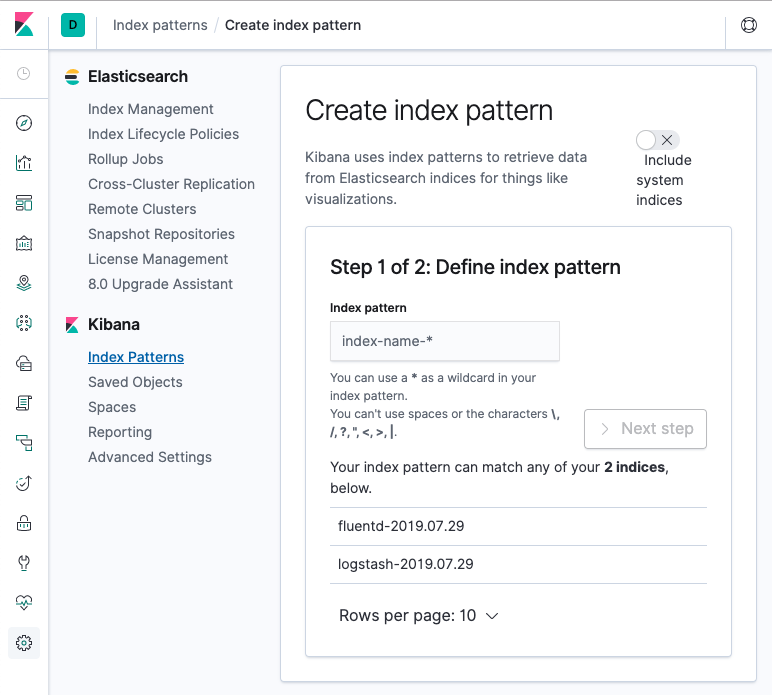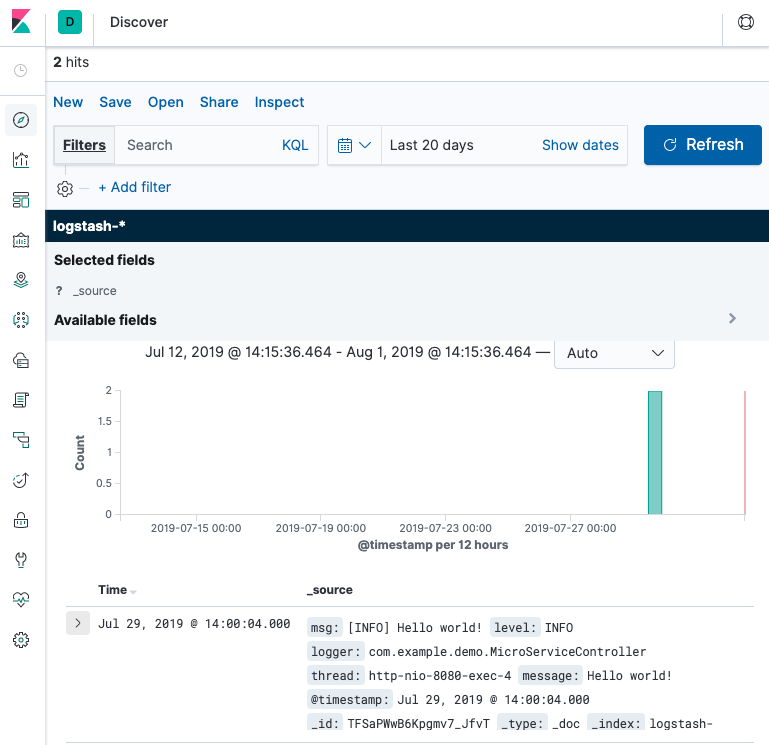- Dockerized spring-boot app with EFK stack for centralized logging
This project presents how to dockerize an spring-boot app and run it together with EFK (elastic-search, fluentd, kibana) stack as a different containers in order to learn how docker and docker-compose work.
Components:
micro-service: spring-boot rest application, it will listen to a simple http get, then it will respond with a hello-world message to the client and write it also in the application log. Logs will be sent to fluentd.fluentd: Unify all facets of processing log data: collecting, filtering, buffering, and outputting logs across multiple sources and destinations. In our case, it will receive logs from the microservice format and forward/post them to elasticsearch.elastic-search: Search engine and a full-text, distributed NoSQL database.kibana: Front-end for elastic-search.
docker and java8
The application is a super simple "micro-service" made in java 8 and spring-boot that exposes one simple endpoint:
curl -i http://localhost:8080/hello-world
HTTP/1.1 200
Content-Type: text/plain;charset=UTF-8
Content-Length: 12
Date: Tue, 23 Jul 2019 14:29:31 GMT
Hello world!% Check the code in app folder.
Build and run the micro-service:
cd micro-service
./gradlew build
java -jar build/libs/micro-service-0.0.1-SNAPSHOT.jar &
open http://localhost:8080/hello-worldBuild the micro-service artifact (from project root folder):
(cd micro-service && ./gradlew build)Write a Dockerfile:
# Download docker from docker hub with all dependencies to run a java 8 application
FROM java:8-jdk-alpine
# Moving the app artifact from the host to the container
COPY ./build/libs/micro-service-0.0.1-SNAPSHOT.jar /usr/app/micro-service.jar
# The WORKDIR instruction sets the working directory for any RUN, CMD, ENTRYPOINT, COPY and ADD instructions that follow it in the Dockerfile.
WORKDIR /usr/app
# With it we inform Docker that a container will listen to specific port, the same as our app is using.
EXPOSE 8080
# Tell Docker to run the application, where first value is a command and the last two are parameters
ENTRYPOINT ["java","-Djava.security.egd=file:/dev/./urandom","-jar","micro-service.jar"]
Build the image and tag it:
docker build -t micro-service ./micro-service/.Check the image is already created:
docker imagesREPOSITORY TAG IMAGE ID CREATED SIZE
micro-service latest 28a816a8dbd9 X days ago 163 MB
...Great! now we have the java application in a controlled container.
Run the image in background:
docker run -d -p 3333:8080 --name ms -t --rm micro-service--name to name th image
--rm to remove when killing the image, if not you will have to docker ps -a and docker rm {id}
Check it is running as expected with docker:
open http:localhost:3333/hello-world or curl -i http://localhost:3333/hello-world
If you want to access to the container sh console:
docker exec -it ms /bin/shNow that we have a docker image with the microservice up and running what we want is to add more containers and make them to communicate, simulating a real environment.
To achieve that we will use docker-compose command:
- Compose is a tool that comes with docker for defining and running multi-container Docker applications, usually used for development and testing purposes. With Compose, you use a YAML file to configure your application’s services. Then, with a single command, you create and start all the services from your configuration.
So, let's write a simple docker-compose.yaml:
version: '3'
services:
micro-service:
image: micro-service
build: ./micro-service
ports:
- "3333:8080"portsExpose ports (HOST:CONTAINER)
And run:
docker-compose upNow if we hit the endpoint in a different terminal:
curl -i http://localhost:3333/hello-world We will see the logs printed in the stdout:
micro-service_1 | 16:40:43.507 [http-nio-8080-exec-2] INFO c.e.demo.MicroServiceController - Hello world!Now, let's configure all the EFK (elasticsearch, fluentd, kibana ) stack to centralize the logs.
Now we need to config the application to send logs to fluentd data collector.
Add fluentd dependency to gradle file
dependencies {
...
implementation group: 'org.fluentd', name: 'fluent-logger', version: '0.3.4'
implementation group: 'com.sndyuk', name: 'logback-more-appenders', version: '1.5.6'
...
}
Add logback file with the fluentd appender:
<?xml version="1.0" encoding="UTF-8"?>
<configuration>
<include resource="org/springframework/boot/logging/logback/base.xml"/>
<!-- If there is no ENV var FLUENTD_HOST then use localhost -->
<property name="FLUENTD_HOST" value="${FLUENTD_HOST:-localhost}"/>
<property name="FLUENTD_PORT" value="${FLUENTD_PORT:-24224}"/>
<appender name="FLUENT" class="ch.qos.logback.more.appenders.DataFluentAppender">
<!-- Check tag and label fluentd info: https://docs.fluentd.org/configuration/config-file-->
<tag>microservice.helloworld.access</tag>
<label>normal</label>
<remoteHost>${FLUENTD_HOST}</remoteHost>
<port>${FLUENTD_PORT}</port>
</appender>
<appender name="CONSOLE" class="ch.qos.logback.core.ConsoleAppender">
<layout class="ch.qos.logback.classic.PatternLayout">
<Pattern>
%d{HH:mm:ss.SSS} [%t] %-5level %logger{36} - %msg%n
</Pattern>
</layout>
</appender>
<root level="info">
<appender-ref ref="CONSOLE" />
<appender-ref ref="FLUENT" />
</root>
</configuration>If we try to run our container or just the app, it will fail.
ERROR o.f.logger.sender.RawSocketSender - org.fluentd.logger.sender.RawSocketSenderIt fails because there is no fluentd running neither in docker or localhost.
To add fluentd we will add three things to make it work:
We will create extend fluentd docker image because we will install an elasticsearch plugin.
All fluentd files are placed in /fluentd folder
FROM fluent/fluentd:v1.6-1
# Use root account to use apk
USER root
# install elasticsearch plugin
RUN apk add --no-cache --update --virtual .build-deps \
sudo build-base ruby-dev \
&& sudo gem install fluent-plugin-elasticsearch \
&& sudo gem sources --clear-all \
&& apk del .build-deps \
&& rm -rf /tmp/* /var/tmp/* /usr/lib/ruby/gems/*/cache/*.gem
COPY fluent.conf /fluentd/etc/
COPY entrypoint.sh /bin/
USER fluent
Check docker hub page for more info.
Now, we need to add a configuration file to control the input and output behavior of Fluentd. We will start with a simple behaviour, just print all logs coming from the microservice to the stdout in the fluentd host:
# Directives that determine the input sources
<source>
# @type 'my_plugin_type': 'forward' plugin turns fluentd into a TCP endpoint to accept TCP packets
@type forward
# endpoint listening to port 24224
port 24224
# The bind address to listen to. In the context of servers, 0.0.0.0 means "all IPv4 addresses on the local machine".
# If a host has two ip addresses, 192.168.1.1 and 10.1.2.1, and a server running on the host listens on 0.0.0.0,
# it will be reachable at both of those IPs.
bind 0.0.0.0
</source>
# This directive looks for events with matching tags and processes them
# in our case it match everything
<match **>
# this output plugin prints events to stdout
@type stdout
</match>
More info for plugins or configuration at official documentation.
Let's add fluentd container to our docker compose file:
version: '3'
services:
micro-service:
build: ./micro-service
ports:
- "3333:8080"
environment:
- FLUENTD_HOST=fluentd
- FLUENTD_PORT=24224
networks:
- microservice-network
fluentd:
build: ./fluentd
volumes:
- ./fluentd/conf:/fluentd/etc
ports:
- "24224:24224"
- "24224:24224/udp"
networks:
- microservice-network
networks:
microservice-network:
# name: microservice_network custom naming obnly available in version 3.5
driver: bridge # we have specified it, but this is the default driverOne problem we face here, is how to enable microservice container to send logs to fluentd container, even more, we don't want to know
about IPs, we just want to send logs to from microservice to a host name fluentd.
To reach the previous requirement, here we have introduced networks, docker provide this feature to connect different containers together.
We are using the default bridge driver, in a nutshell, a bridge network will expose to all containers connected all ports to each other and automatic DNS resolution between containers.
Let's check we it works:
docker-compose up &Wait to docker containers to start and call the microservice endpoint:
curl -i http://localhost:3333/hello-worldNow, if everything worked as expected, we should see both containers logging the message:
micro-service_1 | 16:40:43.507 [http-nio-8080-exec-2] INFO c.e.demo.MicroServiceController - Hello world!
fluentd_1 | 2019-07-28 16:40:43 +0000 microservice.helloworld.access.normal: {"msg":"[INFO] Hello world!\n","level":"INFO","logger":"com.example.demo.MicroServiceController","thread":"http-nio-8080-exec-2","message":"Hello world!"}First let's add the new container with elastic search, in that case we will add the image directly to docker compose yaml, we will get one of the lasts version from https://www.docker.elastic.co/:
version: '3'
services:
micro-service:
image: micro-service
build: ./micro-service
ports:
- "3333:8080"
environment:
- FLUENTD_HOST=fluentd
- FLUENTD_PORT=24224
networks:
- microservice-network
depends_on:
- fluentd
elasticsearch:
image: docker.elastic.co/elasticsearch/elasticsearch:7.2.0
container_name: elasticsearch
environment:
- discovery.type=single-node
volumes:
- esdata:/usr/share/elasticsearch/data
ports:
- 9200:9200
networks:
- elasticsearch
expose:
- "9200"
fluentd:
build: ./fluentd
volumes:
- ./fluentd/conf:/fluentd/etc
ports:
- "24224:24224"
- "24224:24224/udp"
networks:
- microservice-network
- elasticsearch
depends_on:
- elasticsearch
networks:
microservice-network:
driver: bridge
elasticsearch:
driver: bridge
volumes:
esdata:
driver: localHere we have introduced a new network for elastic search, now fluentd and elastic can resolve names and communicate each other.
We also introduced a volumes, these are the mechanisms for persisting data generated by and used by Docker containers, if we don't add them to elastic
search, our data would be erased when the container was killed.
More info about volumes at:
- https://docs.docker.com/storage/volumes/
- https://docs.docker.com/compose/compose-file/ in volumes section
Now to check it worked:
docker-compose up &Then:
curl -i http://localhost:9200
HTTP/1.1 200 OK
content-type: application/json; charset=UTF-8
content-length: 509You should get something like this:
{
"name" : "elasticsearch",
"cluster_name" : "docker-cluster",
"cluster_uuid" : "HeF-rpMlS66FC4zZrTPz5w",
"version" : {
"number" : "7.2.0",
"build_flavor" : "default",
"build_type" : "docker",
"build_hash" : "508c38a",
"build_date" : "2019-06-20T15:54:18.811730Z",
"build_snapshot" : false,
"lucene_version" : "8.0.0",
"minimum_wire_compatibility_version" : "6.8.0",
"minimum_index_compatibility_version" : "6.0.0-beta1"
},
"tagline" : "You Know, for Search"
}We can also check that a volume has been created:
docker volume ls
DRIVER VOLUME NAME
local funwithdocker_esdataAnd even check the volume details:
docker volume inspect funwithdocker_esdataNow, we have to tell fluentd to forward logs that we are getting from the microservice to elastic, to do that we will modify the fluentd config file and add elasticsearch plugin.
<source>
@type forward
port 24224
bind 0.0.0.0
</source>
<match microservice.**>
@type copy
<store>
@type elasticsearch
host elasticsearch
include_timestamp true
port 9200
logstash_format true
flush_interval 5s
</store>
<store>
@type stdout
</store>
</match>
To check it works as expected:
- start the containers
docker-compose up & - hit the microservice in order to generate a log
curl -i http://localhost:3333/hello-world - now a new index should have been generated in kibana with our messages stored:
curl -i http://localhost:9200/_cat/indices\?vAs a response we will get a text like this:
health status index uuid pri rep docs.count docs.deleted store.size pri.store.size
yellow open logstash-2019.07.29 IW2t-CR2Qlyl2LC6oVMuZQ 1 1 110 0 97.8kb 97.8kb
- Then lets pick up the index name
logstash-2019.07.29and query the last doc inserted:
curl -X GET "http://localhost:9200/logstash-2019.07.29/_search?pretty=true" -H 'Content-Type: application/json' -d'
{
"query": { "match_all": {} },
"size": 1,
"sort": { "@timestamp": "desc"}
}
'Et voilà ! Our logs are now stored in elastic search:
{
"took" : 3,
"timed_out" : false,
"_shards" : {
"total" : 1,
"successful" : 1,
"skipped" : 0,
"failed" : 0
},
"hits" : {
"total" : {
"value" : 2,
"relation" : "eq"
},
"max_score" : null,
"hits" : [
{
"_index" : "logstash-2019.07.29",
"_type" : "_doc",
"_id" : "TFSaPWwB6Kpgmv7_JfvT",
"_score" : null,
"_source" : {
"msg" : "[INFO] Hello world!\n",
"level" : "INFO",
"logger" : "com.example.demo.MicroServiceController",
"thread" : "http-nio-8080-exec-4",
"message" : "Hello world!",
"@timestamp" : "2019-07-29T12:00:04.000000000+00:00"
},
"sort" : [
1564401604000
]
}
]
}
}Now we have a centralized logs, but access to them with http actions is not pretty useful, so let's add the missing thing, kibana, a front-end for elasticsearch.
More info about elastic search endpoints in the official docs.
version: '3'
services:
micro-service:
image: micro-service
build: ./micro-service
ports:
- "3333:8080"
environment:
- FLUENTD_HOST=fluentd
- FLUENTD_PORT=24224
networks:
- microservice-network
depends_on:
- fluentd
elasticsearch:
image: docker.elastic.co/elasticsearch/elasticsearch:7.2.0
container_name: elasticsearch
environment:
- discovery.type=single-node
# - "ES_JAVA_OPTS=-Xms512m -Xmx512m"
volumes:
- esdata:/usr/share/elasticsearch/data
ports:
- 9200:9200
networks:
- elasticsearch
expose:
- "9200"
kibana:
image: docker.elastic.co/kibana/kibana:7.2.0
environment:
ELASTICSEARCH_HOSTS: http://elasticsearch:9200
ports:
- "5601:5601"
networks:
- elasticsearch
depends_on:
- elasticsearch
fluentd:
build: ./fluentd
volumes:
- ./fluentd/conf:/fluentd/etc
ports:
- "24224:24224"
- "24224:24224/udp"
networks:
- microservice-network
- elasticsearch
depends_on:
- elasticsearch
networks:
microservice-network:
driver: bridge
elasticsearch:
driver: bridge
volumes:
esdata:
driver: localNow rerun all the containers:
docker-compose-upThen open our browser:
open http://localhost:5601If everything worked as expected, we will see kibana but we won't see any logs :( , no worries we have to create an index pattern, let's click on settings -> index patterns and create one that match oor index:
We have to create and index that fit to us, for example logstash-*.
Then, finally if we go to kibana discover section, we will se our logs!!!:
TODO


